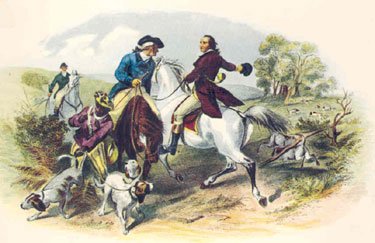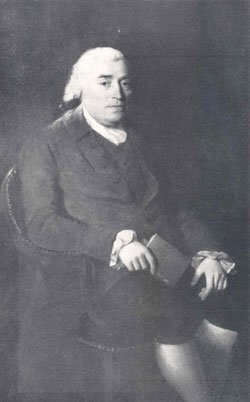George Washington’s Birthday
George Washington, History, Lord Fairfax, Virginia

Col. George Washington, Foxhunter (Ralph Boyer, aquatint, Fathers of American Sport, Derrydale Press, 1931)
David Hackett Fischer (who first traced the pre-Revolutionary influence of four different regions and cultures of Great Britain upon the United States in Albion’s Seed, 1989), in Bound Away: Virginia and the Westward Movement
, written with James C. Kelly and published in 2000, identifies another major and distinctive pre-Revolutionary regional American cultural strain: a tradition of elite patriotism most prominently exemplified in George Washington, but originating from the influence of his friend and mentor, Lord Fairfax.
The Northern Neck [i.e. the region between the Potomac and Rappahannock Rivers] rapidly developed into a distinctive region of Virginia with a character that was largely defined by Lord Fairfax himself and his friends and agents, who included the Washington, Lee, and Marshall families.
Fairfax liked the country so well that he returned as an immigrant in 1747 and made his permanent home in Virginia. He built himself a long, rambling hunting lodge called Greenway Court and a small stone land office high in the Shenandoah country at the western end of his domain. At the same time he became justice of the peace of all the counties in the Northern Neck, county lieutenant, and commandant of the militia. Lord Fairfax acquiesced in the American Revolution and was treated always with honor both by the people of the Northern Neck and the Virginia General Assembly. He died at Greenway Court in 1781 at the age of eighty-eight.
In the course of his long life, a circle formed around him. Lord Fairfax’s drawing room became a school of manners for young gentlemen of the Northern Neck —among them, many Washingtons, Lees, Marshalls, and others who shared a distinctive set of values and beliefs.

Lord Fairfax Fox Hunting with George Washington, engraving by Henry Bryan Hall, after Felix O. C. Darley, from Washington Irving, Life of George Washington, 1855-1859
The Northern Neck was very much a part of the culture of Virginia, but it gave that culture a special meaning. On this frontier there was little of democracy and nothing of equality, but a strong tradition of service, character, right conduct, and the rule of law.
We have been trained by the materialism of American social science to think of regional culture as a reflex of economic interests and environmental conditions. So it is sometimes, but the culture of the Northern Neck was shaped when it was a frontier, in large degree by the interplay of culture, environment, and the purposes of a single individual. A cultural tradition was planted by Lord Fairfax at Greenway Court. It took root in the fertile soil of the Northern Neck and flowered in the careers of George Washington in the Revolution, Robert E. Lee in the Civil War, and George C. Marshall in World War II.
The values of this tradition were in many ways different from the liberal ideas on which the American republic was founded. Yet this tradition supplied that nation with many leaders who served it in a distinctive way. The Northern Neck was the cradle of their culture, and Lord Fairfax was its founding father.
George Washington, born today in 1732, was obviously the greatest epigone of the Northern Virginia tradition of scrupulously dutiful aristocratic leadership. Without Washington, the thirteen colonies could not have won the War for American Independence. As president, Washington then proceeded to establish personally the examples of Republican modesty and executive forbearance which defined the fundamental character of American goverment.





